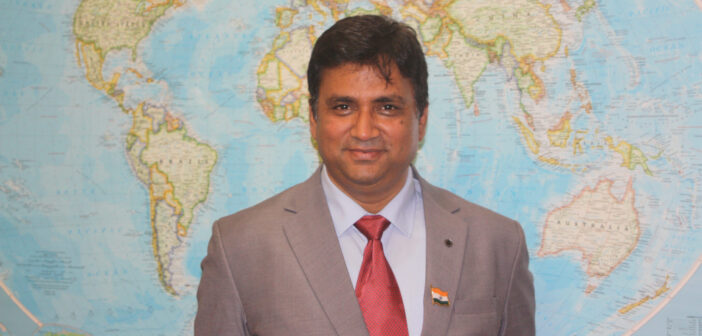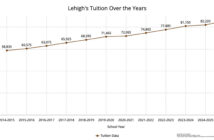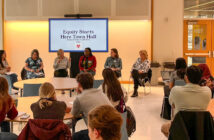Binod Anand is the Secretary General of the Confederation of NGOs of Rural India and has dedicated over 30 years of his professional life to conducting research and establishing policies to create a more sustainable world.
Anand was invited to Lehigh University on behalf of the LU/United Nations Partnership to speak to students at a keynote address on Tuesday.
Before his speech, Anand spoke with The Brown and White about his career in the field of agriculture, his future goals and how members of the campus community can get involved in sustainability.
Can you explain what your role as the Secretary General of the Confederation of NGOs of Rural India entails?
As a member of the Corporation for National Research Initiatives, I was elected as Secretary General of 7,000 NGOs. Most of them are from rural India, and almost 60% of them are where agriculture is a main practice in the history of the economy. We are working to create a robust agricultural value chain as our first goal, where the producer will get their dues, in the whole agriculture value chain which should be farmer-centric.
Any agricultural policies — whether global, local or regional — should also be economically viable, environmentally sustainable, administratively implementable and politically acceptable. Suppose if any of these policies out in the world are not environmentally sustainable. Then, we don’t support it nor work in this continuation.
India’s government has picked me up in a very famous and big committee headed by one of the agricultural secretaries called Minimum Support Price Agricultural Reforms. I’m a member of the Prime Minister’s high power committee on MSP Agricultural Reforms, where we are doing three things through the committee — natural farming and developing policies for it, how there should be diversification of crops and the pricing of produce (and) which should be equitable and sustainable.
Indian agriculture is very diverse with more than 590 crops (being) produced. There are a total of 18 agro-climatic zones (land units in terms of major climates, suitable for a certain range of crops and cultivars), so there cannot be one set of policies. We are trying to recreate looking toward the future with a 2047 or 2070 perspective with an emission rate of net zero. I’m working on the policies with the help of the team, and it’s not only a national thing, it’s a global thing.
We understand you co-founded the Centre for Agricultural Transformation, which is working to transform Malawian agriculture systems and Malawian smallholder tobacco farmers’ lives with access to inclusive innovation in agricultural science and technology. Can you explain some of these innovations?
The very first innovation is centered around the administrative changes which we require. Structural changes in the various strata of the government, not only in the country but globally — these commodities are being traded globally. Exporters trade off agricultural produce globally, so one nation is producing and the other is having their food security. That’s the first policy-level change happening there.
Second is the way farmers should produce and how they are working. Much of the agriculture machinery used by farmers, women cannot use. More than 70% of agricultural practices are being done by female farmers, not male farmers, but there are no tools available for them. There are various machines for the hand work being done, but they are male-centric, not female-centric. The first innovation that we are working on with firms and companies is to ask them and train them during their intervention method of finding the kind of produce and agriculture equipment that are more gender specific. This would not just be used to talk about gender equity and doing research in various multilateral forums but will also be practical to implement.
The third innovation we are working on is the cultural aspect. Agriculture is not only the sowing of the seed and harvesting of crops, it’s also a whole culture. Globally there are various kinds of cultural practices concerned with agriculture. Our system is integrated with agriculture and marriage or way of living. We want to transform this to try to bring out the local aspects that have been lost, the way international changes are being done and the way we have to learn from how the tribal communities were living. If you score historically and anthropologically, there is a relationship. We are not only researching that, like the Lehigh University representative, which (is) our UN representative, but also we are trying to communicate that through various platforms.
The whole globe is talking about sustainability. What is most important is the need to consume energy for development, but also learning how we can make that energy green — and fossil fuel-free. The per capita consumption of energy is something we cannot reduce (with) the way we live, but how is the source of that energy environmentally friendly? So for that matter, we are working on (the) integration of how the best of biofuel(s) can come up from developed countries to developing countries globally and to execute it at the grassroots level.
The Indian Cooperative economic framework suggests means to reduce inequality and to bring peace among communities. What connections do you see between a community’s income levels and involvement in sustainable innovations? How can these be addressed?
There is a Human Development Report…It says that in 2001 the HDR said that 91% of the ICT facilities — the information communication technology facilities — are being utilized by 9% of the global mass in 2001. So think about that. What will happen to the other 91% of people? It also says that 81% of the global energy is utilized by 19% of the population.
We have thought of the cooperative economic framework, where the businesses will be done the way they are being done at this moment, but the dividend will go back to the masses. The profit will be getting distributed to the masses. So 22 people are supposed to curate a cooperative, and there are 1000 members. Are there? Which cooperative is a membership organization? Right? It is a voluntary membership. It is a democratic organization. So the profit will be done (and) the businesses will be done. There will be a managing director, the way corporate runs. So cooperatives are like corporations, but the profit, after one year, the dividend, will go back to the members. So there is a solidarity economy. There is a social economy that can generate, and the inequalities will be reduced.
Lehigh launched a new Sustainability Strategic Plan in 2020, a plan consisting of 113 goals within six focus areas intended to be accomplished by 2030. Each goal is aligned with one or more of the United Nations Sustainable Development Goals — one being Climate Action. Can you explain how climate change impacts agriculture and how Lehigh students can contribute to these goals in their UN partnership and ultimately create a more sustainable campus?
Your campus is already quite a sustainable one. I’ve taken a good round and it’s quite a good thing. Climate action (is) the most important aspect of this, which I perceive to be a local and global initiative. Thinking about creating a biodiversity management committee on campus shows to the globe that the university is managing biodiversity in (its) own way. Since you are very well-educated people, you understand what biological diversity means. It’s everything that can breathe such as plants, humans and animals. That is the kind of thing that can be done on campus. It will show the world what steps the campus is taking to think about climate action.
Just think more about how biodiversity can be conserved (and what) the environment needs to be sustainable and economically viable. All those climate action programs in the UN or wherever it’s being discussed, involve yourself with them, take leadership and talk to the world. Show the beauty of the campus to the world and create a biodiversity management committee along with a biodiversity plan.
How can we approach these topics with those not actively involved in any initiatives and those uninterested in learning about agriculture and sustainability?
Working for agriculture doesn’t mean you’re going into the field, touching the soil and doing the farming. Respecting a farmer, your food and making it more sustainable is paying it back to the farmer and the community. It’s all about what the youth(s) would think about practicing agriculture and thinking of ways to support good policies which are concerned with the practice. These policies surrounding climate, sustainability and agriculture should be pharma-centric. They should also be able to be implemented by the administration as a business that is economically viable and politically acceptable. This role of the youth is very important. That is a juncture where 170 countries are trading commodities, but money is going to the hands of only five to seven countries.






Comment policy
Comments posted to The Brown and White website are reviewed by a moderator before being approved. Incendiary speech or harassing language, including comments targeted at individuals, may be deemed unacceptable and not published. Spam and other soliciting will also be declined.
The Brown and White also reserves the right to not publish entirely anonymous comments.
1 Comment
Awesome explanations with clear vision towards Sustainable reformation